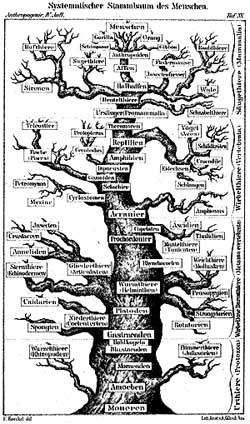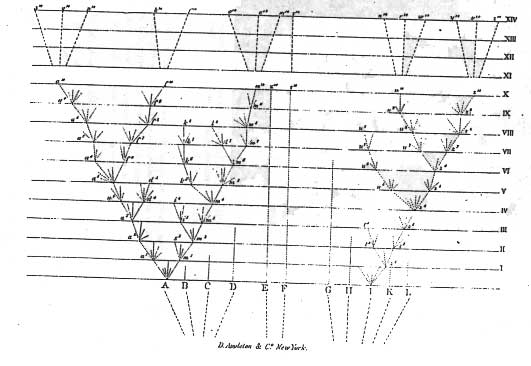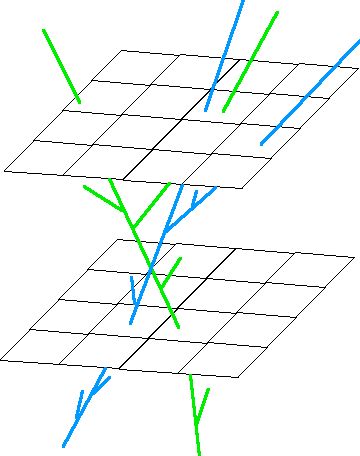Serendip is an independent site partnering with faculty at multiple colleges and universities around the world. Happy exploring!
Evolution as Story II
Adaptive diversity can result from undirected variation and "selection" (= differential persistance, regardless of intent)
Switch in story telling style from non-narrative foundational to narrative foundational to emergence
| Great Chain of Being |
Fixed Entities, Tree of Life |
Emergence |
 |
 |
 |
| spatial order, time irrelevant | time relevant, but playing out eternal or inevitable order | time critical, order changing as it goes along |

Darwin a wide-ranging empiricist
- pigeon breeding
- finches
- Sir Charles Lyell, uniformitarianism
- Malthus, population growth
The contemporary version of the story Darwin triggered:
Given
- inheritance
- undirected reproductive variation
- differential reproductive success
- some degree of reproductive isolation
- enough time
It would be possible to account for the diversity of existing life forms on the earth (including Homo sapiens). One need not presume any plan or intention or goal.
 According to this story, living organisms, including ourselves,
According to this story, living organisms, including ourselves,
- are fundamentally variable
- had ancestors different from themselves
- will give rise to organisms different from themselves
- are defined by ancestry rather than any essential characteristics
- are accidents of history that might have been otherwise
- are equally significant in terms of the evolutionary process
- have additional "meaning" only insofar as it is created by organisms themselves
Most disturbing part of story?
- common ancestry (dethroning humanity)?
- non-essentialism? (dethroning classical thought)?
- non-foundationalism? (dethroning fixed meaning)?
Was Darwin writing "non-fiction" or "fiction"? Was he himself a non-foundationalist? Was he a pessimist?
"When the views entertained in this volume on the origin of species ... are generally admitted, we can dimly foresee that there will be a considerable revolution in natural history. Systematists ... will not be incessantly haunted by the shadowy doubt whether this or that form be in essence a species. This I feel sure, and I speak from experience, will be no slight relief ...
The other and more general parts of natural history will rise greatly in interest ... When ... we regard every production of nature as one which has had a history; when we contemplate every complex structure and instinct as the summing up of many contrivances, each useful to the possesser, nearly in the same way as we look at any great mechanical invention as the summing up of the labour, the experience, the reason, and even the blunders of numerous workmen; when we thus view each organic being, how far more interesting, I speak from experience, will the study of natural history become!
A grand and almost untrodden field of inquiry will be opened, on the causes and laws of variation, on correlation of growth, on the effects of use and disuse, on the direct action of external conditions, and so forth ... The whole history of the world, as at present known ... will hereafter be recognized as a mere fragent of time, compared with the ages which have elapsed since the first creature ... In the distant future, I see open fields for far more important researches. Psychology will be based on a new foundation, that of the necessary acquirement of each mental power and capacity by gradation. Light will be shown on the origin of man and his history.
Authors of the highest eminence seem to be fully satisfied with the view that each species has been independently created. To my mind it accords better with what we know of the laws impressed on matter by the Creator, that the production and extinction of the past and present inhabitants of the world should have been due to secondary causes, like those determining the birth and death of the individual. When I view all beings nog as special creations, but as the lineal descendents of some few beings which lived long before the first bed of the Silurian was deposited, they seem to become ennobled ... we may feel certain that the ordinary succession by generation has never once been broken, and that no cataclysm has desolated the entire world. Hence we may look with some confidence to a secure future of equally inappreciable length. And as natural slection works solely by and for the good of each being, all corporeal and mental endowments will tend to progress toward perfection.
It is interesting to contemplate an entangled bank, clothed with many plants of many kinds, with birds singing on the bushes, with various insects flitting about, and with worms crawling through the damp earth, and to reflect that these elaborately constructed forms, so different from each other, and dependent on each other in so complex a manner, have all been produced by laws acting around us .... Thus, from the war of nature, from famine and death, the most exalted object of which we are capable of conceiving, namely, the production of the higher animals, directly follows. There is grandeur in this view of life, with its several powers, having been originally breathed into a few forms or into one; and that, whilst this planet has gone cycling on according to the fixed law of gravity, from so simple a beginning endless forms most beautiful and most wonderful, have been, and are being, evolved." (pp 394-398)
What about "survival of the fittest"? "nature red in tooth and claw"?
Not phrases Darwin used, nor actually expressive of his perspective (cf Charles Darwin, Aboitionist)
Herbert Spencer, sociologist/philosopher, Principles of Biology, 1864 ... social darwinism
Different, somewhat conflicting stories about evolution, Spencer won for a while
Further evolution of the story of evolution to come ... things Darwin didn't know about
- time span
- genetics
- the impact, creative potential of randomness
- the brain as a story teller
- order/meaning from randomness?



Comments
Post new comment